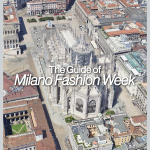
An analysis of the Gucci - Athens case
Greece refuses to sell off its beauty and the public opinion splits
February 18th, 2017
Lately it seems like the Biggest names of fashion are all involved in a competition in order to secure themselves exclusive historically relevant locations. What they often offer in change is the money for the restoration of aforementioned monuments and historical location that local administrations are in desperate need for. In few years we saw Diego Della Valle, CEO of Tod's, paying 25 milions to restore the Colosseum and putting advertising banners during the restoring-process. Then Fendi spending 2,5 milions to restore Trevi's fountain and grab the chance to set up their fairy-tale Haute Fourrure show, and also the Pallazzo della Civiltà Italiana that is now their new HQ. Also Bulgari took a place in this rush and spent 3,5 milions to renovate the Piazza di Spagna's steps and the "Barcaccia" Fountain, where the brand organized a exclusive concert to celebrate their 150 anniversary.

The pubblic opinion is literally split in two halves when it comes to comment this kind of ventures. Some people clam that this is speculation on the artistic heritage of our county, others affirm that using pubblic places of historical interest for private events of brand advertising is to deprive people of a pubblic good. Yet there are other ones instead that consider acceptable for a private to take care of public art and historical patrimony and also there's who think that also the counterpart that brands take from covering renovation expenses can be an advantage for the city, because that kind of events are capable to bring the international jet-set in the city that hosts them. What we must underline, by the way, is that in all the previous examples we are speaking about Italian Brands that decided to invest money on the Italian territory in order to take care of the national archeological and artistic heritage. Even if the methods can be questionable, everything else is a matter of fact. This presupposition is fundamental in order to analyze and give a proper context to the Gucci case, that made the world talk in last days.

Reliable sources report that the brand offered 2 millions to Athens to gains the privilege of a 15 minutes fashion show on the Acropolis. The news became viral mostly due to the decision of the Athens government not to accept Gucci's offer, considering the proposal inappropriate due to the historical relevance of the monument and its value for the city and the whole country. Even if is quite sure that Gucci meant no harm with its proposal and just made it for the sake of spectacularity and surprise that-everyone knows- moves nowadays fashion, on the other hand it's easy to understand the reasons of Athens Administration denial. For some personalities, the discriminating lies in the fact that, in this case, it was not a brand that decides to invest resources in its territory and preserves its beauty in exchange for an advertising return.The fact that the money offered to Athens was a considerable sum at a time of difficulty for different nations, could have done more to assist the believe that the offer of money by a foreign company to a city and a country that is known to be facing a period of great economic and financial uncertainty, in order to "sell off" their own history. Well, it's not exactly what happened.

Yet, if it's true that crisis tore apart 25% of Greek GDP, its also true that both Greek government and people showed to put dignity first in every occasion. Greek government had to make hard choices in the last years both politically and financially, but always faced these hard times head-on. This is the main reason why Gucci offers sounded like an offense to Greek government and people's ear. Because a foreign company should not take advantage from their financial issues trying to buy off the monuments that represent national identity. To accept such an offer would have meant to accept the idea of putting money before national values and a country passing through hard times can only survive if it is ready to put its national identity and its values before everything. But what has not been emphasized is that Gucci had offered to pay 2 million not only for the rights to the airing of the show, but that their intention was, in fact, to develop a long-term contract with Greece face the restoration of some of the most celebrated historical valuable goods in need for protection.
That between Gucci and Athens it has become in a short time a real media event that left room for many speculations. If for Fendi and Bulgari intervention on their territory of origin can be considered acceptable, why the Gucci proposal towards a country known fo being in trouble has provoked all this scandal? Perhaps because, as a successful company cares about its image and how it is perceived from the outside, so does a nation?























































